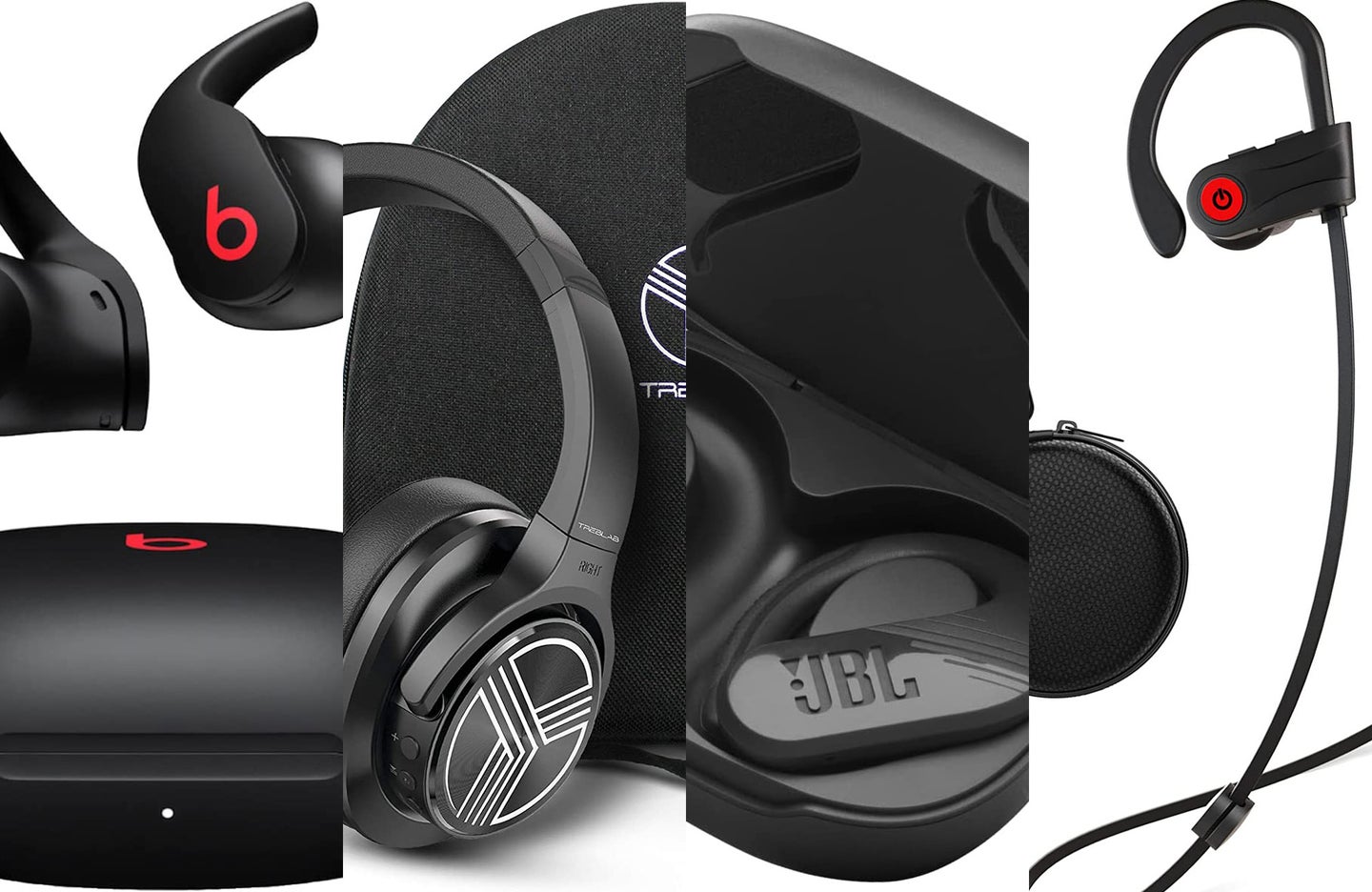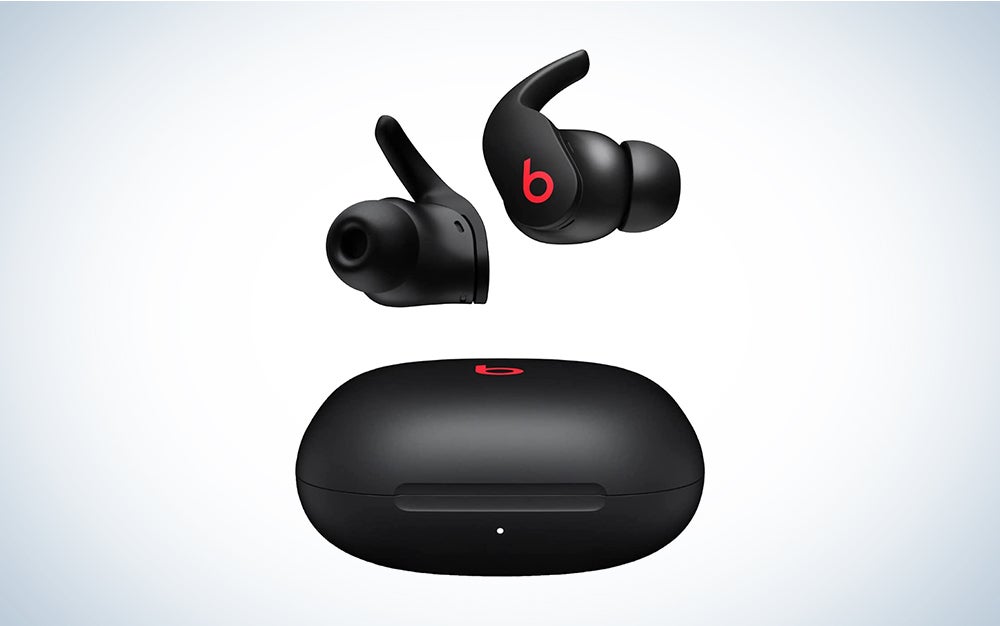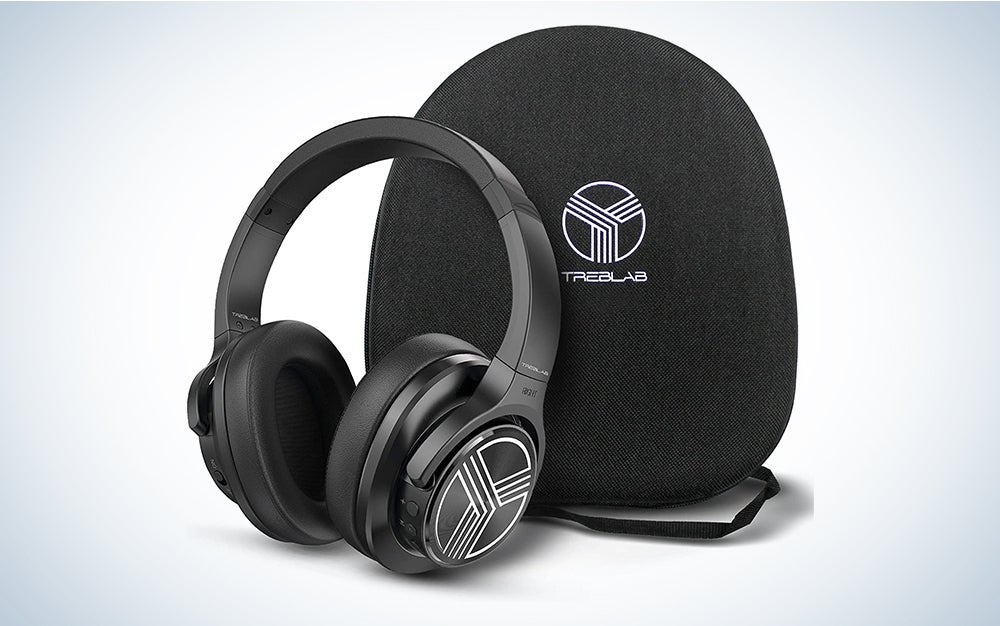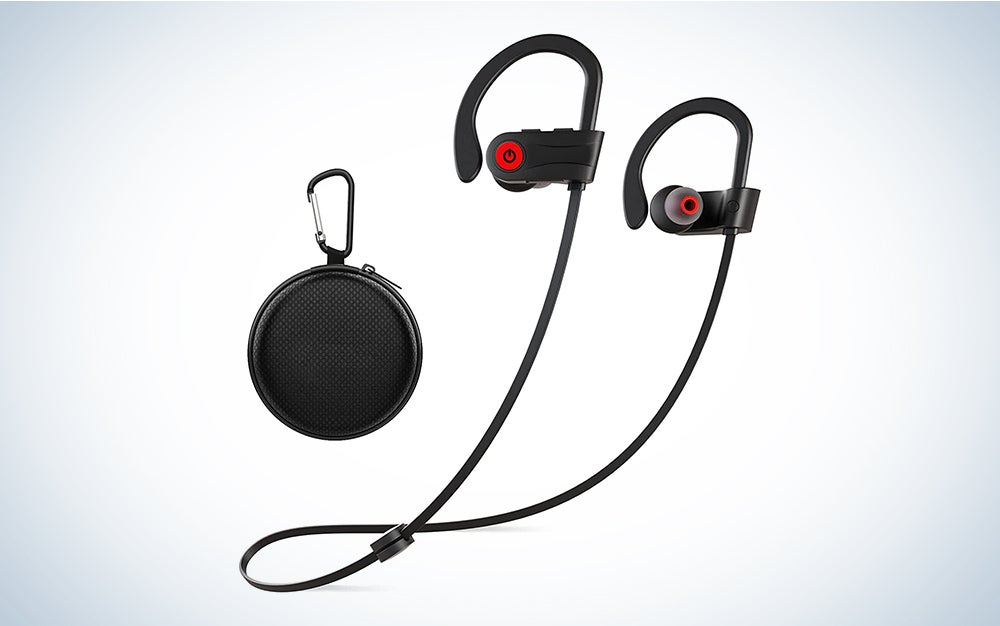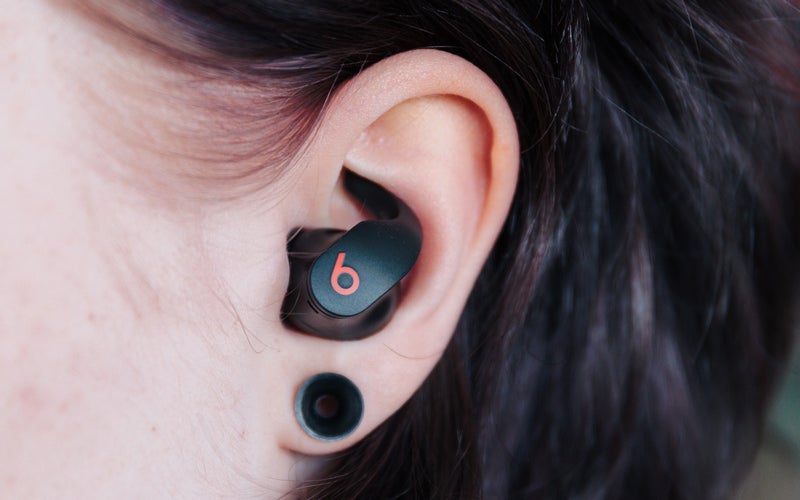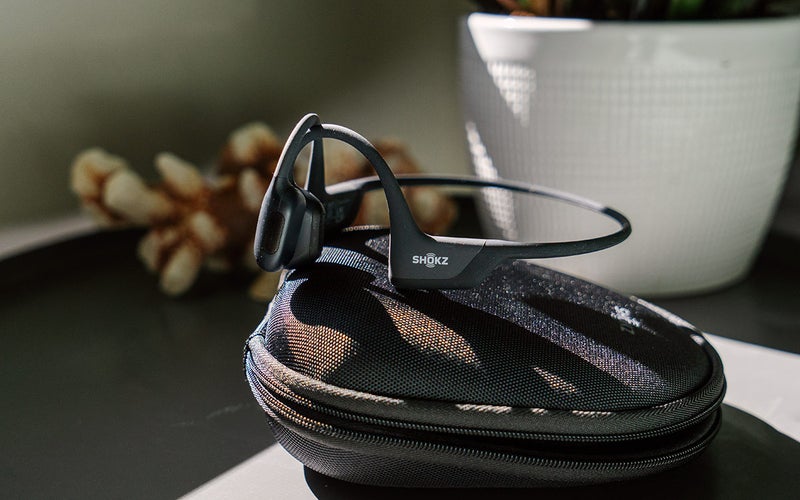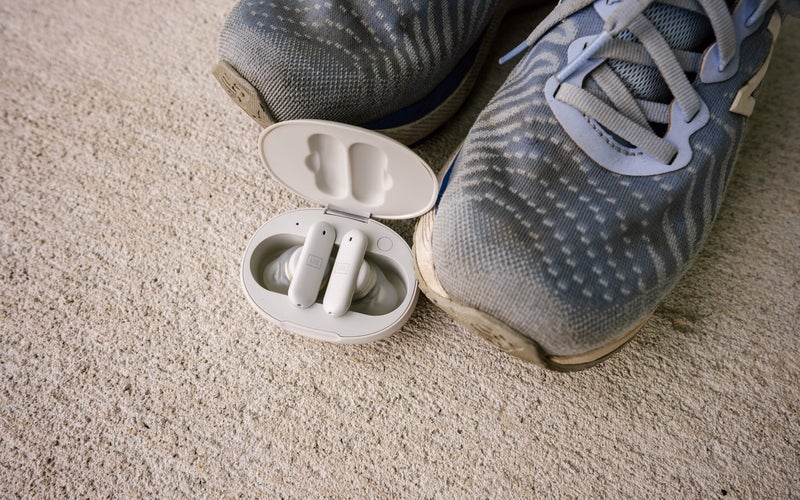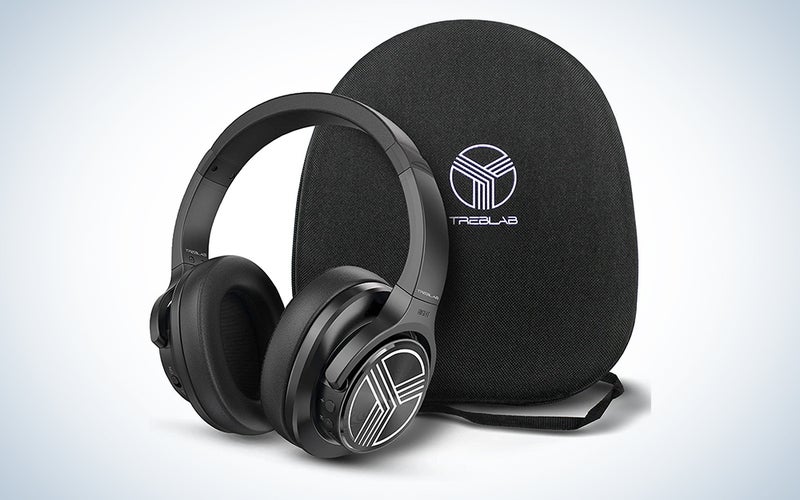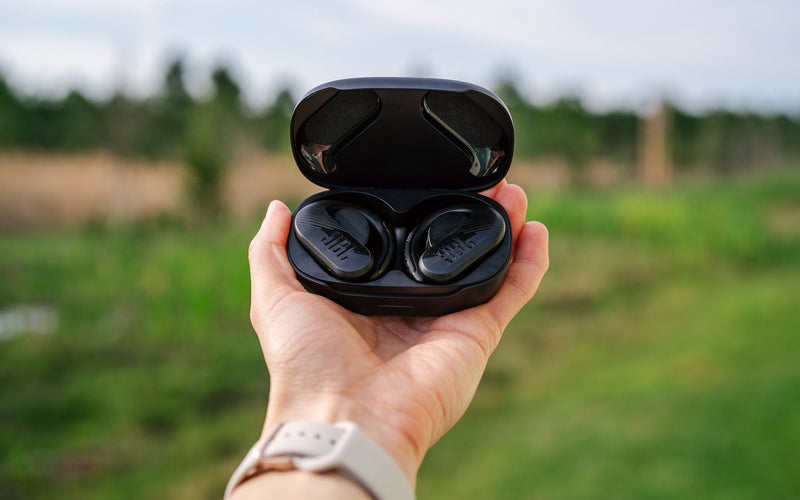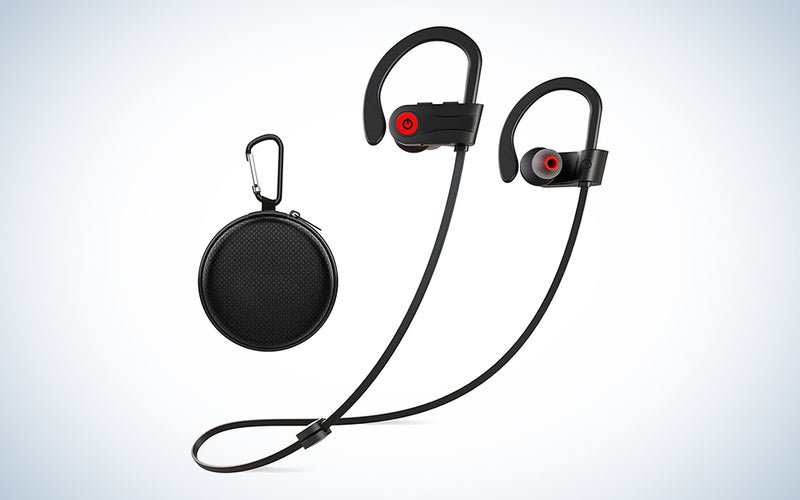We may earn revenue from the products available on this page and participate in affiliate programs. Learn more ›
Choosing the right pair of running headphones is essential for getting through your workout comfortably and safely. Listening to your favorite music and podcasts while running, jogging, and participating in other endurance exercises is a great way to bear up and push yourself that extra mile. Unlike traditional headphones and earbuds that come in all shapes and sizes, often more concerned with aesthetics than activity, the best running headphones are super lightweight and snug-fitting. They typically feature waterproof designs with long battery life. We’ve selected some of the best running headphones on the market to help you make an informed decision no matter where your workout takes you.
- Best overall: Apple Beats Fit Pro
- Best bone-conduction: SHOKZ OpenRun Pro
- Most comfortable: Ultimate Ears FITS
- Best over-ear: Treblab Z2
- Best for city runs: Sony LinkBuds
- Best battery life: JBL Endurance Peak 3
- Best budget: Otium U18 Earbuds
How we chose the best running headphones
The best running headphones are wireless, and Bluetooth requires power. Running out of battery life during a workout is inconvenient at best, so we built our list with options that feature battery capacities between 10 hours and 50 hours to ensure they’ll endure through at least two average workout days before recharging. Running headphones should fit comfortably and allow the user to exercise unencumbered, so our picks are relatively lightweight and feature secure, customizable fit options. Most of the headphones on our list are earbuds, but we added an over-ear and a bone conduction option to cover every possible use scenario and style preference.
Breaking a sweat is a normal part of running, so we selected headphones with Ingress Protection ratings ranging from a splashproof IPX3 to a completely dustproof and waterproof IP68. Most of the headphones on our list offer environmental transparency/situational awareness tech, from the ambient mic modes of the JBL Endurance Peak 3 and Apple Beats Fit Pro to the actually open designs of the Sony LinkBuds and SHOKZ OpenRun Pro.
The best running headphones: Reviews & Recommendations
Running can boost the production of your brain’s endorphins and help you de-stress. With this in mind, finding the best running headphones shouldn’t be a stressful endeavor. One of our picks should help get you on a runner’s high.
Best overall: Apple Beats Fit Pro
Stan Horaczek
Why it made the cut: The Apple Beats Fit Pro earbuds combine user-friendly design and great sound in a snug-fitting form factor.
Specs
- Weight: 0.2 ounces/earbud; 2.3 ounces with case
- IP rating: IPX4 (splash-resistant)
- Battery life: 7 hours single-charge; 30 hours with case
Pros
- Features Apple H1 chip for quick pairing and spatial tracking
- Compact form factor and tight fit perfect for running
- Great sound quality with ANC and transparency modes
Cons
- Requires iOS device to use all features
- Case incompatible with wireless charging
- No multipoint pairing
We recently featured the Apple Beats Fit Pro in our roundup of the best headphones for working out, and they’re also our top pick for running. They feature a relatively neutral and well-rounded sound profile with crisp highs that make them great for a wide range of listening duties, and their inclusion of active noise cancellation (ANC) and transparency modes make them equally useful on the road and at the gym. The Beats Fit Pro are super lightweight and compact in and out of its charging case, making them easy to keep in your pocket and comfortable to wear while active. They’re also some of the most secure earbuds we’ve tested thanks to their unique flexible wingtip design that sits firmly against the outside of your ear, aided further by three sets of interchangeable silicone ear tips.
As we mention in our full review, the Beats Fit Pro offer a user experience very similar to that of the Apple AirPods Pro thanks to their built-in H1 chip, which allows for quick and effortless pairing to your iOS device, as well as access to Apple’s immersive head tracking and spatial audio technologies. These buds do work with Android devices—you connect to them as you would any other Bluetooth earbuds—but non-iOS users will, unfortunately, miss out on those H1-provided benefits. We also wish the Beats Fit Pro featured better waterproofing than the same IPX4 rating shared by Apple’s regular line of AirPods. They also lack wireless charging and multipoint pairing, which are features that would ease switching gears before and after a run. Still, we can’t shake how we can’t shake ’em loose.
Best bone-conduction: SHOKZ OpenRun Pro
Abby Ferguson
Why it made the cut: The OpenRun Pro’s open-ear bone-conduction design allows you to work out and listen to your favorite music while maintaining full situational awareness.
Specs
- Weight: 0.95 ounces
- IP rating: IP55 (dust- and water-resistant at low pressures)
- Battery life: 10 hours single-charge
Pros
- Open-ear design for maximum situational awareness
- Highly resistant to dust and water
- Headband design stays put during the ups and downs of running
Cons
- Sound quality is limited due to design
- Audible to others
- Proprietary charging cable is inconvenient to replace
If you frequently work out in parks or along roads where you share space with bikes and cars, a pair of bone-conduction headphones like the SHOKZ OpenRun Pro will be the safest and most convenient choice for your runs. Like all of the best bone-conduction headphones, the OpenRun Pro uses vibration to send audio through your cheek and directly to your earbones, bypassing your ear canal entirely and leaving it open so you can stay aware of approaching traffic while listening to your favorite music. The OpenRun Pro weighs just under one ounce and features a snug-fitting headband design that sits comfortably around your ears and stays put through even the most strenuous sprints, and its high dust- and water-resistant design make it a great choice for exercising on any terrain in any weather.
While the design of the OpenRun Pro is perfect for maintaining situational awareness while running, it lacks bass response. That’s not entirely necessary if you’re running to podcasts or ambient/classical music, but it leaves something to be desired in dance, rock, and other bass-heavy music. Others will also be able to hear what you’re hearing, so they’re not a great choice for use on public transit or in quiet places. Plan on taking the OpenRun Pro out for multiple workouts between charges? The headphones’ 10-hour battery should be more than flexible enough, but remember that they use a proprietary magnetic charger rather than something universal like USB-C.
Most comfortable: Ultimate Ears FITS
Abigail Ferguson
Why it made the cut: These ultralight running headphones from Ultimate Ears are custom-fit to your ears to deliver one of the most comfortable workout listening experiences available.
Specs
- Weight: 0.26 ounces/earbud; 2.04 ounces with case
- IP rating: IPX3 (splash-resistant at up to 60-degree angle)
- Battery life: 8 hours single-charge; 20 hours with case
Pros
- Moldable eartips are custom-fit to your ears
- Neutral midrange frequency response with custom EQ available in-app
- Sweat-resistant design
Cons
- Design protrudes far from ear
- Sub-bass response is lacking initially
- No active noise cancellation
The Ultimate Ears FITS—or UE FITS if you’re nasty—are an incredibly comfortable and lightweight pair of custom-fit running headphones with a design and setup process that seem straight out of a sci-fi movie. After removing the FITS from their package for the first time, users simply place the earbuds in their ears and initiate the molding process via a smartphone app, during which the photosensitive polymer ear tips are literally molded to the shape of your ears with the help of some built-in flashing LEDs. Apart from downloading the app, the entire setup process takes roughly 60 seconds, after which you’re free to use the earbuds however you see fit. The process feels alien but not uncomfortable. Despite being very light and comfy, the FITS tend to protrude further from the ear than other earbuds, which may bother users who prefer a streamlined look. Those with sensitive, small ears, however, will appreciate the ability to wear them comfortably for hours.
The sound of the Ultimate Ears FITS is relatively neutral yet lacking in low frequencies out of the box; luckily, it’s easy to sculpt using the in-app EQ, so you can get lows to reach a runner’s high. They, unfortunately, don’t feature active noise cancellation, but their snug fit allows them a good measure of passive noise cancellation that can be useful in gyms and other crowded environments. The FITS’ sweat-resistant IPX3 rating is also a bit lower than the minimum IPX4 we’re used to seeing in this class of earbuds, but they’ll still make it through many a sweaty session unscathed.
Less athletically inclined but still like the idea of custom-fit earbud comfort for running errands (or the occasional power walk)? UE offers the DROPS, which have a more involved, more handcrafted process resulting in bespoke acrylic housings tailored to your personal specifications and aesthetic.
Best over-ear: Treblab Z2
TRELAB
Why it made the cut: The Treblab Z2 headphones are a uniquely light, comfy over-ear option with a long battery life that makes them great for taking on a run.
Specs
- Weight: 0.53 pounds
- IP rating: IPX4 (splash-resistant)
- Battery life: 35 hours
Pros
- Super light and comfy design for running unencumbered
- Very long single-charge battery life
- Built-in control buttons are intuitive and easy to use
Cons
- No charging case
- ANC mode changes the sound profile, performs unreliably
- Prone to leaking audio
While over-ear headphones aren’t an ideal choice for running due to being much heavier and bulkier than earbuds, the Treblab Z2’s combination of lightweight comfort and long 35-hour battery life will have you covered if you have your heart set on a more traditional design. The Z2 features an IPX4 waterproof rating that’s tough enough to stand up to sweat and rain, and it has easy-to-use audio controls placed conveniently on each earcup, plus a simple switch to toggle ANC mode. They come in a custom-fit zip-up carrying case that makes them easy to stow in a gym bag, and they charge using an included micro USB cable.
The Treblab Z2’s sound profile is fairly neutral and balanced out of the box, but its ANC mode tends to roll off a lot of the headphones’ bass frequencies, giving the audio a somewhat unappealing mid-forward sound. With ANC engaged, the headphones almost give the impression of changing their EQ to mask environmental noise rather than performing active cancellation. The Treblab Z2s also feature light and airy earpads that make them very comfortable to wear while running. They do tend to leak some sound if you push the volume (not that you should, even if you push the tempo), so you’ll likely want to avoid using them in quiet or shared environments.
Best for city runs: Sony LinkBuds
Tony Ware
Why it made the cut: The Sony LinkBuds use a unique open-ring design to let in environmental noise while delivering the fit and sound of traditional earbuds.
Specs
- Weight: 0.14 ounces/earbud; 1.45 ounces with case
- IP rating: IPX4 (splash-resistant)
- Battery life: 5.5 hours single-charge; 17.5 hours with case
Pros
- Unique ring design lets in ambient noise
- Very comfortable and lightweight fit perfect for running
- Midrange-forward sound is great for spoken word
- EQ adjustable via the Sony Headphones Connect app
Cons
- No noise cancellation
- Very little sub-bass response
- Others can hear what you’re listening to
If you’re looking to maintain a level of situational awareness similar to that given by bone-conduction headphones but prefer the look and feel of earbuds, Sony’s innovative LinkBuds are worth considering. This unique pair of lightweight earbuds—small enough to hang from succulents, as shown above—use a ring-shaped speaker and flexible anchor to stay secure within your ear while letting in ambient noise. This makes them a great choice for running in loud environments and areas with heavy traffic. The size of each fin can be custom-fitted to your ears using an included selection of five sizes, resulting in an incredibly comfortable and snug fit that won’t budge during your run. The LinkBuds aren’t quite as easy to hear through as bone conduction headphones due to their placement in the ear canal, but they do feature a similar midrange-heavy sound with slightly more low-end. If the buds leave you wanting a little more bass, you can also fine-tune their sound further using the Sony Headphones Connect app.
Controlling the Sony LinkBuds involves either tapping directly on the earbuds or on your own facial cartilage in front of the ear, a gesture that works well but takes some getting used to. Some users reported false triggers when engaging in activity, but this effect can be mitigated by selecting the right fin size to ensure the fit is as tight as possible. Because of their open design, the LinkBuds also tend to leak sound and provide no form of noise cancellation at all, so while they might not be the best choice for critical listening unless you’re in the quietest environment (one that wouldn’t mind hearing a bit of what you’re enjoying), there’s really nothing else quite like them if you prefer the fit and feel of earbuds.
Best battery life: JBL Endurance Peak 3
Abigail Ferguson
Why it made the cut: These rugged IP68 earbuds pack up to 50 hours of battery life thanks to their charging case, making them ideal for travel and frequent use.
Specs
- Weight: 0.9 ounces/earbud; 4.5 ounces with case
- IP rating: IP68 (dustproof and waterproof for 30 minutes)
- Battery life: 10 hours single-charge; 50 hours with case
Pros
- Highly waterproof and dustproof
- Very secure-fitting ear hook design
- Super long battery life
Cons
- Lack active noise canceling
- No multipoint pairing or wireless charging
- Muddy and low-heavy sound, but can be EQ’d
JBL’s new Peak Endurance 3 running headphones are a fantastic option if you run daily but don’t always have the opportunity (or memory) to charge your devices. They feature a generous 10-hour single-charge battery life plus another 50 hours thanks to their compact charging case, making them a great choice for stowing in a gym bag or for traveling. The fit of the Endurance Peak 3s uses a wireless ear hook design (JBL refers to the hooks as “TwistLock ear hook enhancers”) similar to that of the Powerbeats Pro, which goes around the back of your ear and works in tandem with three silicone ear tip options, resulting in a comfortable wearing experience that remains stable while running despite not going too far into the ear canal. They even stay stable while doing side plank rotations. The Endurance Peak 3s are also waterproof and dustproof at a very high IP68 level, which makes them impervious to salt water and easy to clean with a simple rinse.
The sound of the Endurance Peak 3s is a bit muddy out of the box, but JBL’s companion app provides an easy-to-use EQ that helps sculpt their sound to your liking. They also don’t have active noise-cancelling abilities, but the tips combined with their shape do a good job of blocking out your surroundings. Still, they do feature JBL’s Ambient Aware mode, which is effective for engaging in conversation at the gym or on the street without having to pause and remove them from your ears. However, we wish they featured conveniences like multipoint device pairing and wireless charging. And, the ear hooks get in the way of sunglasses, which is a pain while running outdoors in the bright sun. If these aren’t major cons for you, their secure fit, battery life, and ease of use make these headphones perfect for running in nearly every way.
Best budget: Otium U18 Earbuds
Otium
Why it made the cut: Otium’s U18 earbuds feature a secure ear hook design similar to that found in running headphones three times their price.
Specs
- Weight: 3.52 ounces
- IP rating: IPX7 (waterproof for 30 minutes; not dustproof)
- Battery life: 15 hours
Pros
- Great battery life and secure fit on a budget
- IPX7 waterproof for sweaty workouts
- Set of easy-to-use controls
Cons
- Slightly muddy sound profile
- No active noise cancelation
- Charging design is cumbersome
If you love listening to music while running but don’t want to spend a lot, the Otium U18s are a great value thanks to their battery life, secure fit, and IPX7 waterproof rating. They feature an ear hook-based design similar to that of the JBL Endurance Peak 3 and the Powerbeats Pro, with the inclusion of a connective neckband that makes them easy to hang around your neck when not in use and keeps them from getting separated. The U18’s sound profile is a bit muddy and leaves something to be desired, and because they don’t come with any EQ-enabled companion apps you’ll need to explore other options to sculpt their sound. But if you just need a beat to beat your personal best, these are a budget way to get that.
As a set of budget headphones, the Otium U18s are fairly stripped down and lack conveniences like active noise cancelation, wireless charging, and ambient modes. They do have a set of onboard controls, including an on-ear button and a rocker switch, both of which are intuitive and easy to use, but charging the headphones is a little more difficult and involves opening a small, tight-fitting door for access to a micro USB port. Still, if you’re not picky about sound quality or noise canceling, the runner-friendly fit of the U18s makes them worth a look.
What to consider when buying the best running headphones
Most of the best headphones should avoid even a hint of moisture. Heck, even some of the best Bluetooth earbuds might not be suited for more than a brisk stroll. That’s why we’ve put together these things to look at before adding something to your cart:
Do you run in a city environment?
Running in a city environment near bikes, cars, and other forms of traffic requires a high level of situational awareness to ensure you stay out of harm’s way. The best-running headphones for urban environments and crowded places include the Sony LinkBuds, which feature a snug earbud design, and the SHOKZ OpenEars Pro, a bone-conduction design that leaves your ears completely open.
How important is sound quality to you?
If you fancy yourself an audiophile, go for running headphones with a well-rounded sound profile like the Apple Beats Fit Pro, which have extended low-end response and present highs. Some running headphones also allow you to customize their EQ via smartphone apps, including the JBL Endurance Peak 3 and Ultimate Ears FITS.
Do you need waterproof running headphones?
If you frequently run in moist environments or sweat a lot, picking a pair of running headphones with some measure of waterproofing is essential. All the best running headphones are in some way splash/sweat-resistant, but if you need maximum protection, models such as the JBL Endurance Peak 3 and Jabra Elite 7 Active are some of the best waterproof options we’ve tested.
FAQs
Q: How much do running headphones cost?
Running headphones can run you between $20-$200, depending on features.
Q: Are noise-canceling headphones safe for running?
Noise-canceling headphones aren’t the safest choice for running due to their ability to block out noise from bikes, cars, and other traffic. If you’re running on a treadmill at the gym, ANC might be desirable for staying in the zone. Runners who listen to music outside, however, should almost always consider open-ear headphones like the Sony LinkBuds earbuds or the SHOKZ OpenRun Pro.
Q: Do running headphones need to be waterproof or sweatproof?
In general, running headphones need to be waterproof to weather the conditions of a workout. Headphones contain small and sensitive electronics that can be damaged by moisture from rain or sweat, so any pair of running headphones worth considering will have an IP rating of at least IPX3, like our most comfortable pick, the Ultimate Ears FITS. If you work out in particularly muddy or salty environments, the super-rugged IP68-rated JBL Endurance Peak 3 are probably the best option.
Q: Are headphones or earbuds better for running?
Earbuds are almost always better for running than headphones due to their inherently lighter weight, smaller form factor, and secure fit. The Sony LinkBuds are the most lightweight running earbuds we’ve tested, weighing 0.14 ounces per bud. If you have your heart set on using traditional headphones for your workout, we love the relatively light design and snug fit of the Treblab Z2.
Final thoughts on the best running headphones
- Best overall: Apple Beats Fit Pro
- Best bone-conduction: SHOKZ OpenRun Pro
- Most comfortable: Ultimate Ears FITS
- Best over-ear: Treblab Z2
- Best for city runs: Sony LinkBuds
- Best battery life: JBL Endurance Peak 3
- Best budget: Otium U18 Earbuds
For most runners, the easy-to-use Apple Beats Fit Pro are the best headphones, thanks to their well-rounded sound profile, ANC capabilities, and secure fit. Runners in city areas who want to maximize their situational awareness should consider the in-ear Sony LinkBuds or the SHOKZ OpenEars Pro. In contrast, runners interested in the most comfortable fit should look at the in-ear Ultimate Ears FITS or the over-ear Treblab Z2. For more intense workouts, the long battery life, secure fit, and high resistance to water and dust of the JBL Endurance Peak 3 make them a worthy contender. If you’re shopping for running headphones on a budget, it’s hard to beat the sub-$30 Otium U18 Earbuds, which feature a secure ear hook design and 15 hours of single-charge battery life. Now get those feet pounding on the pavement and run off into the sunset, your favorite running tunes pumping in your ears.
Why trust us
Popular Science started writing about technology more than 150 years ago. There was no such thing as “gadget writing” when we published our first issue in 1872, but if there was, our mission to demystify the world of innovation for everyday readers means we would have been all over it. Here in the present, PopSci is fully committed to helping readers navigate the increasingly intimidating array of devices on the market right now.
Our writers and editors have combined decades of experience covering and reviewing consumer electronics. We each have our own obsessive specialties—from high-end audio to video games to cameras and beyond—but when we’re reviewing devices outside of our immediate wheelhouses, we do our best to seek out trustworthy voices and opinions to help guide people to the very best recommendations. We know we don’t know everything, but we’re excited to live through the analysis paralysis that internet shopping can spur so readers don’t have to.
